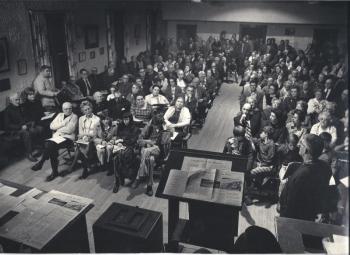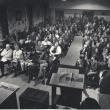This Week in Lincolnville: 52 Years Ago This Week
July 3, 1970 was a big day for Wally and I, the closing on our house. Married just three months, we were finally moving in together.
I weighed 123 pounds and still had both my own knees. He was still the skinny guy I see in the photos from 1957, his year in Korea. We were embarking on that tricky ship called marriage.
No kids, just a dog named Tantry Bogus (from a Ben Williams story) and two ducks we called Heckle and Jeckle. Goats, a cow, chickens and pigs were just a gleam in our eyes. Boys? Three boys? Not even a gleam that day.
We’d bought the house from Nat and Vonnie Stone back in March, and had spent the spring traveling to Lincolnville after school to paint the house, he from Castine and I from Rockland where we each were teaching. In the process, we got to know them both.
CALENDAR
MONDAY, June 27
Selectmen, 6 p.m., Town Office
TUESDAY, June 28
Library open, 3-6 p.m., 208 Main Street
Comprehensive Plan Review Committee-Heart and Soul Presentation, 7 p.m., LCS
WEDNESDAY, June 29
Library open, 2-5 p.m., 208 Main Street
Planning Board, 7 p.m., Town Office
THURSDAY, June 30
Soup Café, noon, Community Building, 18 Searsmont Road
FRIDAY, July 1
Library open, 9-noon, 208 Main Street
SATURDAY, July 2
Library open, 9-noon, 208 Main Street
EVERY WEEK
AA meetings, Tuesdays & Fridays at noon, Community Building
Lincolnville Community Library, For information call 706-3896.
Schoolhouse Museum by appointment, 505-5101 or 789-5987
Bayshore Baptist Church, Sunday School for all ages, 9:30 a.m., Worship Service at 11 a.m., Atlantic Highway
United Christian Church, Worship Service 9:30 a.m., 18 Searsmont Road or via Zoom
UPCOMING EVENTS
July 9: Strawberry Festival
It wasn’t until July 3, when to celebrate the long-awaited closing, Nat and Vonnie took us to the Beach Inn (most recently Chez Michel) and treated us to the double lobster special ($5.95). And over dinner told us they were getting divorced. An amicable divorce apparently as they then took us on a tour to show us all their favorite places. I only remember one, the long road down to Knights Pond in Northport.
Here’s the town we were moving to, the town we were planning to spend our lives in. Of course, he did, and I still plan/expect/hope to.
Nine hundred and thirty four people lived in Lincolnville. Our road, 173, had no name. Road names came much later. When a car drove by we noticed. Especially in the winter when I’d run to the window to see who it was, then wonder why he/she was going towards the Beach and not the Center. Or vice versa. You not only knew who it was but where they likely would be going.
Sleepy Hollow was a treacherous road in the winter and people avoided going this way if they could. A barrel full of sand with a shovel in it set at the top of the Hollow. People knocked on our door when they got stuck, asking to use our phone.
There was a pay phone at the top of Snow Hill; there used to be a motel there. There used to be a pay phone at the Beach.
The Beach post office was in today’s Fine Art and Antiques Gallery, a small affair with a counter and a wall of mail boxes. The Center P.O. was in a room off the house at 233 Main Street.
Each summer Bob Anderson would set up his large canvas tent – The Indian Camp – on the spot that is today’s post office, carrying on his Penobscot grandparents’ basket making tradition. Leo and Florence Shay had come here from Indian Island every summer, for the sweetgrass that grew here as well as the basket-buying tourists that showed up.
Much of the rest of Lincolnville’s population in 1970 was descended from the town’s earliest white settlers with names like Heal/Heald, Young, Thomas, French, Miller, Frohock, Moody, Munroe, Fletcher, Eugley, Drinkwater, Oxton, Morse somewhere in their background. Who did I leave out?
The Center Fire Department is today’s Boat Club. Dean and Eugley’s garage, where today’s Library sits, sold gas, fixed cars, and was the place men sat around every morning to share the latest news.
The Center General Store was run by Maynard and Betty Heal when we came, a place where kids stopped in after school, those who didn’t ride the bus.
There was no town office, just a little room in the school where the three selectmen met. Eileen Young was the town clerk and kept all the town records in her enclosed-porch office on Camden Road, the house where her daughter lives today. Eileen was known to issue licenses in the middle of the night to guys coming up from Massachusetts for the first day of hunting.
She would preside over the ballot box during town meeting, making sure that every voter was a resident. As far as I know, she didn’t have to check her list unless you were new to town. By the next town meeting she’d know you.
Sally Laite, clerk at the Lincolnville Telephone Company in the Center, would call to alert someone (me) that the “boys” (Bob Libby and Jerry Chalmers) were on their way to shut off the (my) phone; “I’ll give them a cup of coffee to give you time to get out here with a check,” she’d say.
A later town clerk, Doris Weed, would call to remind you your dog license or car registration was due.
The school in 1970 had four classrooms, a basement lunchroom, two small offices – one for the principal (who also taught 8th grade and for six years was Wally) and one for the selectmen.
The staff consisted of four teachers (including the principal), a part-time remedial reading teacher, and two traveling teachers who I think covered Hope and Appleton as well – Robin Heald for art and Pat Magee for music. No gym, no gym teacher. No guidance counselor, school nurse or ed techs. Polly Moody made hot lunch; her peanut butter fudge is still remembered fondly. Kenny Hall was the janitor. Today we’d call him the custodian.
Lincolnville’s first through fourth graders rode the bus to Hope and Hope’s fifth through eighth graders came to Lincolnville. There was no kindergarten. Children were 6 years old before they went to school.
Lincolnville’s farmers were still holding on. Bill Munroe, Raymond Oxton, Ken Calderwood, Clarence Thurlow were still milking cows. Tank trucks picked up milk on a regular schedule for Hood Dairy. Every open field was a hayfield; the last week in June and first week of July tractors pulled rickety balers, working their way around the stone walls of these old fields leaving behind a scattering of bales. Boys could always find work helping some farmer hay. The whole town smelled of drying hay.
Long, multi-storied hen houses held thousands of broilers, birds that grew from day-old chicks to eating size in 8 weeks. Trucks delivered bulk grain, blowing it into the large silo-like tanks at the chicken barns.
You knew it was pick-up day for Belfast’s broiler plants when feathers blew along the roadside, from the open crates full of birds piled high on the trucks. Every once in a while, a chicken would escape; we’d get a call – “We found a chicken on the road; do you want it?” Sure, we’d take a free chicken, and add it to our flock.
Fifty-two years have passed, years that have transformed a 26- year-old bride into an old grandma of seven, an already used-up old house into a two-family homestead, and a small, rural, still barely agricultural town into a multifaceted community of 2300+.
So, what happens next?? Who/what will we be in the next fifty years? Or even in the next decade?
Unlike in 1970 we get a chance to decide, or at any rate, to weigh in on what we’d like our town to be. Our state-mandated Comprehensive Plan is being re-visited, updated this year by a committee of five: Susan Silverio, chair, Drew Strout, vice chair, Pat Shannon, secretary, Cheryl Nevius, Lys McLaughlin, and Terry Moulton. As part of the process the committee will be engaging in Community Heart and Soul, a “resident-driven process that engages the entire population of a town in identifying what they love most about their community, what future they want for it, and how to achieve it.”
In four phases residents identify what makes their town unique and how they connect emotionally to each other. First, teams are formed to build awareness and reach out to everyone in our town. Next, stories are gathered to identify what matters most to people about Lincolnville. Then, plans are developed that can guide future town planning. Finally, these plans are incorporated into the Comprehensive Plan and used to guide future decisions.
These are three statements that get us nowhere:
- “I don’t want us to become Connecticut or Camden or New Jersey…..etc.”
- “I want us to remain just like we are (or were)
- “I don’t know what I want, but I’m afraid of change”
Instead, how about this:
“I’m not sure what I want, but I’m willing to talk about it.”
And that’s what Heart and Soul is looking for.
Our voices really do matter, even if it feels like nothing ever happens. Just look again at the above story of Lincolnville 52 years ago, what this town was like then and what it’s like today. Change happens whether we want it or not.
We hold the seeds to our future; it’s time that we begin sharing them with each other to reach consensus on what you want your town to be when you’re an old grandma or grandpa with a multitude of grandbabies (or maybe just a dog and a couple of ducks).
Come to the school Tuesday, June 28 at 7 p.m. to hear the Community Heart and Soul presentation and how we all can be a part of it.
Broadband: Our Future
The town’s Broadband Committee urges everyone to take this internet speed test. The committee needs this data from everyone in town who uses the internet to help them in securing grants to improve Lincolnville’s internet service.
It’s an easy step we all should take in consideration of both our present and future ability to use the internet: I just did and it took 3 minutes. You fill in your address and click a couple of boxes and that’s it. I got 39.41 download speed and 9.44 upload speed. Although I’m happy with my internet speed, the town’s Broadband Committee says anything under 100 Mpbs download and 20 Mpbs upload (and I have no idea what Mpbs is, nor do I need to know for the purposes of the committee) says I’m underserved. As in, not prepared for what our future internet needs will be.
Once you take the test your house shows up on the Maine Broadband Coalition Map You can zoom in and see your location marked with a dot. So far only 32% of Lincolnville households have done this, so if you haven’t yet, do it now. It will be a tremendous help to the folks working hard for us on this committee.
Strawberry Festival is Back!
The United Christian Church’s Strawberry Festival will be on Saturday, July 9 at the Community Building and churchyard, 18 Searsmont Road. Mark your calendar for the parade, the hot dogs, the games, the music and of course, the strawberry shortcake!
Personal Responsibility Act
Although I try to stay away from the hubbub that is our country’s current political reality in this column, I couldn’t resist passing on this item I plucked from Facebook:
“Using DNA as verification, paternity for every embryo should be established and the male responsible obliged by law to support the woman and the child through the child’s majority including medical costs, living costs, education – all the costs a father normally asåsumes for his child. In addition, the child should have a full share of the father’s estate if and when the father dies. If women cannot decide whether or not to carry a child, fathers should not be able to decide whether or not to support the woman and child. It’s about time men assumed responsibility for the consequences of their pleasure.”


























